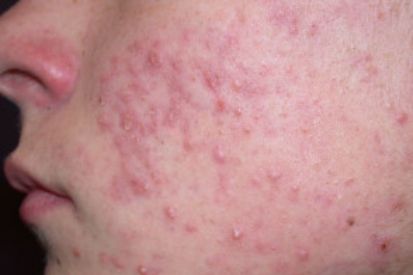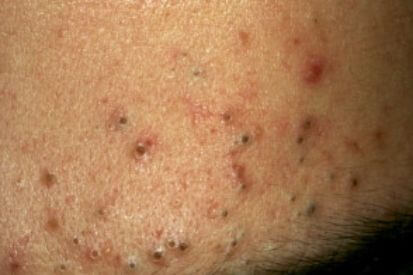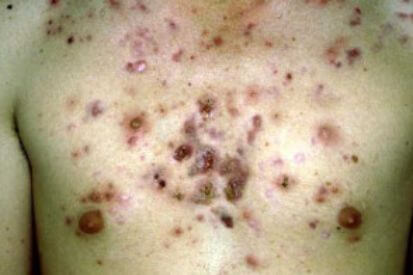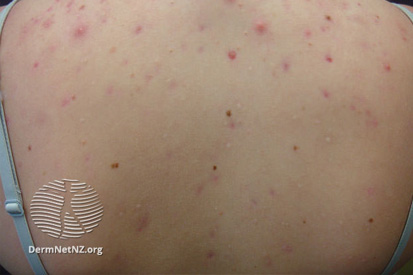Acne
At Pinehurst Dermatology & Mohs Surgery Center, your skin health is our top priority. Whether you're dealing with acne at 13, 23, or 53, we encourage you to book an appointment with one of our experienced dermatology providers. We'll develop a personalized treatment plan tailored to your skin's specific needs. Begin your journey to clearer, healthier skin today!
Examples of Acne




What are the Symptoms of Acne?
Before you can understand how to get rid of acne, it’s important to know the symptoms and how they may appear. Acne can range from mild blemishes to more severe, painful lesions, and it often affects not just the face but other areas of the body as well.
Common acne symptoms include:
- Pimples, blackheads, and whiteheads
- Red, inflamed bumps (papules)
- Pus-filled lesions (pustules)
- Large, firm nodules under the skin
- Painful cysts that may leave scars
- Breakouts on the face, neck, chest, back, shoulders, upper arms, or buttocks
What Causes Acne?
Acne develops when oil, dead skin cells, and bacteria build up in the pores, leading to inflammation and breakouts. Hormonal fluctuations are one of the most common triggers, especially during puberty, menstruation, and pregnancy, when hormone levels can increase oil production. Bacterial infection within clogged pores further aggravates the skin, creating redness, swelling, and sometimes painful lesions.
Other factors can exacerbate acne, including an unhealthy diet, certain medications, and stress. While stress doesn’t directly cause acne, it can trigger flare-ups and slow skin healing. Recognizing these influences is crucial for selecting the appropriate treatment and prevention plan.
- Hormonal Fluctuations: Hormonal changes, especially during puberty, menstruation, and pregnancy, can stimulate acne.
- Bacterial Infection: When hair follicles become clogged with excess oil and dead skin cells, bacteria multiply, triggering inflammation.
- Diet: Some studies suggest that certain foods may influence acne development.
- Medications: Certain medications can contribute to acne development.
- Stress: Stress doesn't directly cause acne, but it can exacerbate existing conditions.
How to Prevent Acne
Preventing acne starts with simple, consistent habits that support healthy skin. By following a daily routine and making mindful lifestyle choices, you can reduce breakouts and maintain clearer skin over time.
Key acne prevention strategies include:
- Cleansing your face twice daily with a gentle, non-comedogenic cleanser
- Moisturizing with an oil-free, non-comedogenic product
- Staying hydrated and maintaining a balanced diet
- Avoiding touching your face to reduce bacterial transfer
- Seeking personalized guidance from a dermatologist for persistent issues
Working with an expert at Pinnacle Dermatology can help you establish a foundation for lifelong skin health and create a routine tailored to your unique skin needs.
Acne FAQs
The acne improvement timeline varies based on severity, treatment type, and personal factors. Over-the-counter products may start showing results within a few weeks, while prescription medications like retinoids or antibiotics could take several weeks to a few months. Patience and consistency with the treatment plan are key. If your acne shows little improvement or worsens, your dermatologist might adjust the treatment.
Acne is a widespread skin condition that can impact individuals of any age, gender, or ethnicity. While it is often linked to the hormonal changes of adolescence, acne can also continue or emerge in adulthood.
Luckily, acne is a treatable condition. If you are struggling with acne, schedule an appointment with a trusted Pinehurst Dermatology provider for a personalized treatment plan based on your skin's needs.
Dermatologists customize acne treatments according to skin type and condition severity. Common options include topical retinoids, benzoyl peroxide, oral antibiotics, and sometimes oral contraceptives or isotretinoin. Light and laser therapies might also be suggested. Results vary, but many see a significant reduction in acne, improved skin texture, and less scarring. Sticking to the prescribed treatment plan is crucial for the best results.
Yes, dermatologists provide treatments for acne scarring, such as laser therapy, chemical peels, microneedling, and fillers. Though complete scar removal isn't always possible, significant improvement is often achievable. Dermatologists create personalized treatment plans, set realistic expectations, and guide patients toward smoother, more even skin. Early intervention and regular follow-up with a dermatologist are essential for achieving the best results in managing acne and scarring.
From our QualDerm Family of Brands: Acne Treatment Options
How to Treat Acne
Effective acne care isn’t one-size-fits-all. At Pinnacle Dermatology, our specialists create personalized plans that may include topical creams and gels, oral antibiotics, hormonal therapy, or retinoids for more severe cases. Each treatment is designed to reduce breakouts and target the underlying causes of acne.
Our dermatologists take the time to identify what’s driving your acne and build a treatment strategy that works for you. Whether you’re dealing with occasional flare-ups or chronic, severe acne, we’re here to help you achieve clearer, healthier skin. Schedule your appointment with Pinnacle Dermatology today and take the first step toward lasting results and renewed confidence.
Featured Products for Acne
Check your local office for current stock!
Check your local office for current stock!
